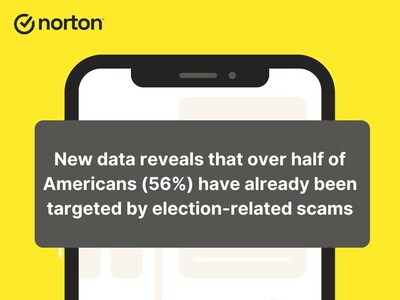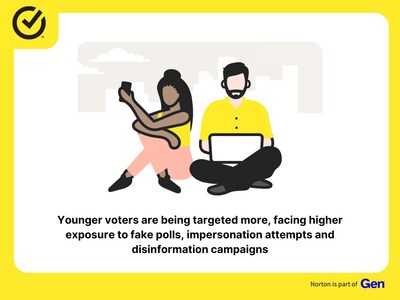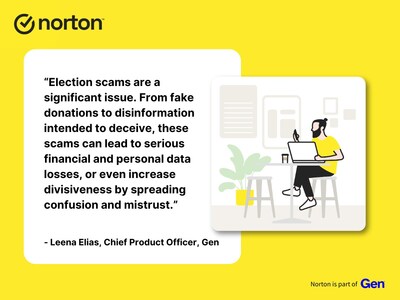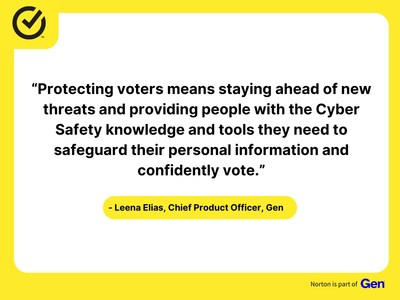Election Scams on the Rise: Over Half of Americans Targeted with Election Scams
New Norton Survey Finds Younger Voters Under 35 Targeted Most with Fake Polls, Donation Scams and Disinformation
"Election scams are a significant issue. From fake donations to disinformation intended to deceive, these scams can lead to serious financial and personal data losses, or even increase divisiveness by spreading confusion and mistrust," said
Who's at Risk?
Younger adults are most at risk of being bombarded by election scams, with two-thirds (66%) of those aged 25 to 34 reporting encounters. According to the
Financial Losses
Alarmingly, nearly one in five (19%) individuals targeted by election scams fell victim, with 88% of victims reporting financial losses. On average, victims report losing over
Voter Concerns: Rising Anxiety Over Election Scams
As
These fears are not unfounded. Several common scams have emerged during this election cycle:
- Robocalls: Topping the list of reported scam attempts, over one-third (37%) of participants reported being targeted by election-related robocalls, which disproportionately target Americans over the age of 55 (45%).
-
Fake News /Disinformation: One-fifth (20%) of respondents reported encountering misleading information, with voters aged 25 to 34 particularly at risk—with 28% being targeted by such tactics. - Political Donation Scams: One in five (19%) expressed worry about the legitimacy of texts and emails asking for money. With the average person receiving 11 fundraising messages a week, it can be challenging to sort through what is real and what is not, which is why nearly half (48%) of voters choose to delete and two-thirds ignore political messages all together.
- Impersonation Scams/Deepfakes: About one in ten (10%) participants say they encountered impersonation scams and deepfakes, which were notably more prevalent among individuals aged 25 to 34 (20%).
- Fake Polls and Surveys: 17% of those surveyed were targeted by attempts to capture and steal personal information in fake polls, with the highest instances among the 18 to 24 age group (25%).
Additionally, while 82% of respondents confirmed their intention to vote, 40% of those voters expressed concerns about the legitimacy of polling stations. Voters 55 and older had the most confidence in polling stations (71% had no concerns vs 49% of people 25 to 34). Some of the concerns about polling stems from misinformation, raising concerns of what sources the public trusts to get their political information. Traditional news outlets are the most trusted (75%), followed by friends and family (25%). Interestingly, only about one in five (19%) said they trust official candidate platform information, only slightly higher than those who trust social media (16%).
Your Guide to Staying Safe This Election Season
To help protect yourself from election-related scams, Norton recommends the following:
- Verify Sources: Always check the credibility of the information you receive. Stick to official election websites and trusted news sources for accurate updates.
- Be Cautious when Donating: If you're considering donating, research the organization first. Legitimate organizations will provide clear information on how donations are used.
- Look for Red Flags: Be wary of unsolicited messages or phone calls asking for personal information or money. If something feels off, trust your instincts and investigate further. When in doubt, you can check in with
Norton Genie , a free AI-powered scam detector, and in seconds, find out if a message you received is likely a scam and what to do next. - Report Suspicious Activity: If you encounter a potential scam, report it to the appropriate authorities. Education is Key: Share this information with friends and family, especially younger voters who may be more susceptible to these scams.
Norton urges voters to stay informed and alert in the lead-up to
For more information on how to safeguard against election-related scams, visit https://www.gendigital.com/blog/news/innovation/ai-elections-2024.
Methodology
The study was conducted online within
About Norton
Norton is a leader in Cyber Safety, and part of Gen™ (NASDAQ: GEN), a global company dedicated to powering Digital Freedom with a family of trusted consumer brands. Norton empowers millions of individuals and families with award-winning protection for their devices, online privacy, and identity. Norton products and services are certified by independent testing organizations including AV-TEST, AV Comparatives, and
|
|
|
|
|
Gen |
|
|
|
|
|
|
![]() View original content to download multimedia:https://www.prnewswire.com/news-releases/election-scams-on-the-rise-over-half-of-americans-targeted-with-election-scams-302279716.html
View original content to download multimedia:https://www.prnewswire.com/news-releases/election-scams-on-the-rise-over-half-of-americans-targeted-with-election-scams-302279716.html
SOURCE





